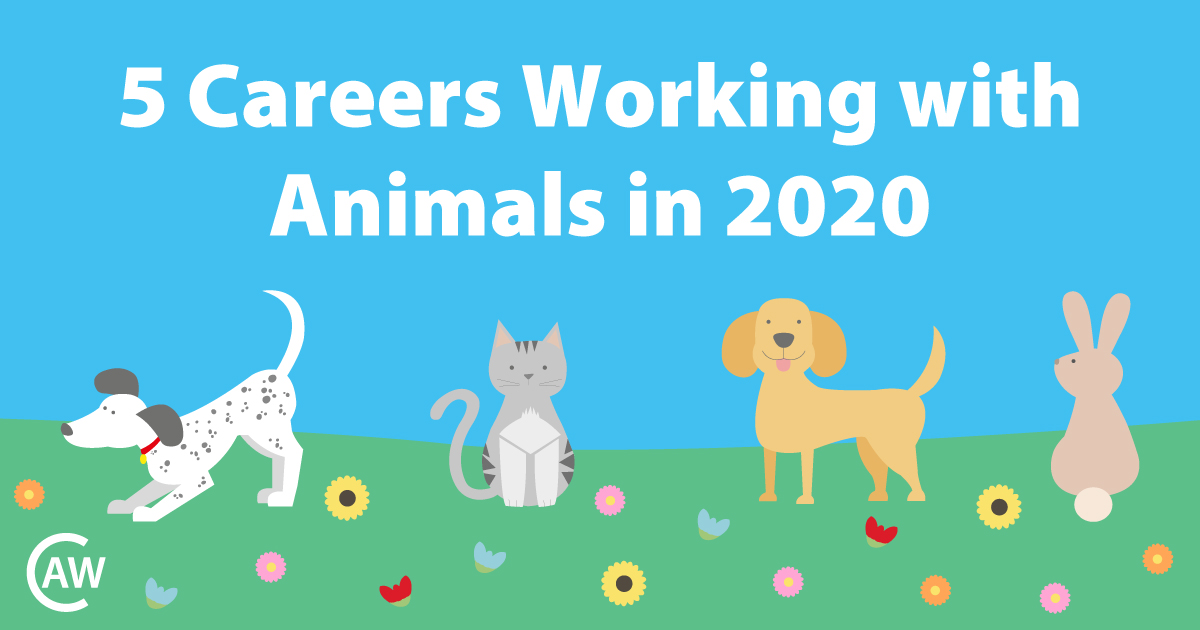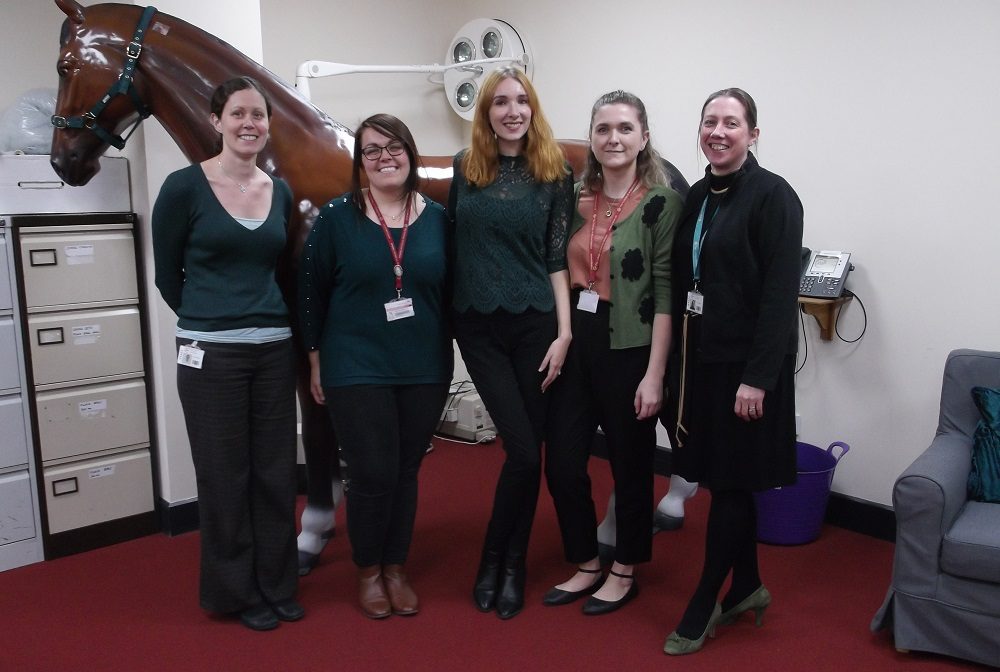Cheryl Humphreys works at The College of Animal Welfare, teaching on the Level 2 and 3 Dog Grooming courses. In light of April being National Disability Month, Cheryl wanted to share her experience with deafness in order to raise awareness. Read below for her interview:
Can you tell us a bit about what you do at CAW?
I am a Practical Skills Dog Grooming Tutor based at the College’s Huntingdon centre. I guide and teach the Level 2 and 3 Dog Grooming courses, as well as assess students. I have been working at CAW for over three years now.
Can you tell us about your cochlear implant? What exactly does it do?
I was fitted with a cochlear implant in August 2019 and had it switched on in September 2019. This has been fitted to my right ear. I have had a severe bilateral hearing loss from a very early age, which was discovered whilst I was in infant school. I always wore two hearing aids prior to implant. For the last 20 years the hearing aids haven’t been helping me. I did look into a cochlear implant when I was in my late teens but decided against it. Now I love it. My life has changed so much. I can hear myself talk. I’m able to use the telephone, which has never been possible in my life ever. I’m still learning and gaining confidence in using it but it’s incredible how much easier it is. I used to have to rely on others, or search around the premises to make contact with someone! I can also hear dogs now so that helps a lot too.
Do you think your disability has had a positive impact on your life?
My deafness has never been an issue for me. I was brought up to reach for things myself in life. Try first then ask if unsuccessful. I was taught in mainstream school with extra support as my father was determined to keep life as normal as possible. Luckily the school was incredible and wanted to support me. I did quite well, achieving several GCSEs and even a diploma in higher education via sixth form. I had speech therapy whilst attending school to aid my speech. Most people say that don’t realise or even forget I’m deaf because my speech is really good. I have since achieved my Level 2 and level 3 Dog Grooming qualifications and am currently doing my masters. I have my assessors award too. I never want to stop learning and improving to better myself.
What impact has your cochlear implant had on your life?
My cochlear implant has given me so much confidence and has meant I’m able to do more myself. During the current COVID-19 pandemic I would be very isolated if I didn’t have my cochlear implant. But now I am able to reach out to my friends when I’m feeling anxious or worried about mental health issues I’ve had previously by calling them on the phone. I can also sit in the garden and listen to tell birds and sounds which had never been possible with hearing aids.
What challenges have you faced as a deaf woman in the industry?
I have worked hard to be a knowledgeable and respected member in the dog grooming world. I’ve competed against groomers all over the country in competitions, groomed many breeds for showing and have even worked alongside vets. I’ve tried to earn a reputation of knowledge and information. I offer a lot of guidance on social media grooming pages. In the grooming world I don’t face difficulties as such as it’s an area I’m happy and confident in. People actually tend to forget I’m actually deaf! I did used to struggle with blogs done on social media and in busy seminars. I tended to miss the talk as I struggled to hear it. But now that I have my cochlear implant I can get involved again.
What would you like people to know about your disability?
I’d like people to not make judgements until they’ve listened to a deafened person. I was actually nearly turned down on an equestrian course at a local agricultural college many years ago because the tutor thought it would be hard to teach me on top of a horse. This was based on paperwork submitted to enrol onto a course. I made arrangements to visit after I was turned down and his opinion actually changed after he met and talked with me. Unfortunately, I turned the course down for other reasons but made a point of saying to “not judge a book by its cover”.
Ask if any help is needed or wait to be told, not assume. I’ve always wanted to achieve for myself before I ask. Also shouting doesn’t achieve anything, neither does slowly speaking. Just act as you usually would. I used to get embarrassed speaking to young guys as I would have to stare at their faces in order to listen to them. It can make people uncomfortable.
Another challenge I’ve found is people expect me to know sign language. As a deaf person this was only available if I paid to do the course. A deaf person shouldn’t have to pay to learn how to communicate. I’m lucky I can lip read well but it would be a very lonely and isolated world if I couldn’t lip read and had no money to learn sign language. It can take up to 10 years to learn sign language fully, it also changes in different areas and countries. But I never had access to this growing up.
Is there any advice you would give to those with a disability who are wanting to start out in the industry?
Go for it. Ask. Never be afraid to push yourself.


 Many people want to work with animals, but aren’t sure what career options are out there for them. Or, you might already have your dream job in mind, but don’t know what steps you need to take to achieve it. Since we spend such a large portion of our lives at work, it’s important to enjoy the work you do. So, if you love animals and want to work with them, make sure you pursue this and find the right job for you. Read below for an overview of five careers working with animals that you might not have considered before.
Many people want to work with animals, but aren’t sure what career options are out there for them. Or, you might already have your dream job in mind, but don’t know what steps you need to take to achieve it. Since we spend such a large portion of our lives at work, it’s important to enjoy the work you do. So, if you love animals and want to work with them, make sure you pursue this and find the right job for you. Read below for an overview of five careers working with animals that you might not have considered before.





 If you’re looking to top up your CPD hours, you’ll be pleased to hear that we’re offering 30% off all 2020 CPD courses* when booked online throughout February.
If you’re looking to top up your CPD hours, you’ll be pleased to hear that we’re offering 30% off all 2020 CPD courses* when booked online throughout February.
 Whether you’ve recently landed a big promotion to Head Veterinary Nurse, have been in the position for years, or are aiming to move into such a role in the future; you have probably asked yourself at some point: what makes a good Head Veterinary Nurse?
Whether you’ve recently landed a big promotion to Head Veterinary Nurse, have been in the position for years, or are aiming to move into such a role in the future; you have probably asked yourself at some point: what makes a good Head Veterinary Nurse?



 We’re pleased to say that dates have been confirmed for our annual Head Nurse Congress event. The 2020 congress will be taking place on Tuesday 12 and Wednesday 13 May, following popular demand for a weekday event as opposed to the usual weekend congress.
We’re pleased to say that dates have been confirmed for our annual Head Nurse Congress event. The 2020 congress will be taking place on Tuesday 12 and Wednesday 13 May, following popular demand for a weekday event as opposed to the usual weekend congress.






